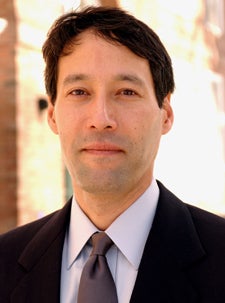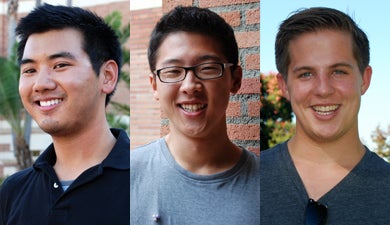New Minor Invites Study of Korea’s Complexities
Whether it is South Korea’s booming economy or North Korea’s nuclear ambitions, the business and politics of the Korean Peninsula make headlines on a regular basis, said David Kang.
“Solving the North Korean nuclear problem is a major issue. Then you have South Korea, which is America’s eighth largest trading partner. What happens in Korea has an effect on the United States. We’re deeply interlinked,” said Kang, director of the Korean Studies Institute (KSI) and interim director of the East Asian Studies Center (EASC) in USC Dornsife.
To delve more deeply into the political, economic, social and cultural changes in the region, USC Dornsife has launched a new minor in Korean studies this Fall. Students in USC Dornsife and across the University of Southern California will have the opportunity to focus their research on Korea by taking courses from across the social sciences and humanities.
For the minor, students choose one lower division course for four units and four upper division courses for 16 units from a designated list of classes. They can mix and match courses based on their interests.
Many of the classes focus on contemporary issues in Korea, such as “Business and Politics in the Korean Peninsula,” “Gender in Korean Film and Literature,” and “Korea: The Modern Transformation.” Students can also study Korean language and literature, and earn units by participating in related study abroad programs, such as the Global East Asia program offered through EASC.

“What happens in Korea has an effect on the United States. We’re deeply interlinked,” said David Kang, professor of international relations and business. Kang is also director of the Korean Studies Institute and interim director of the East Asian Studies Center, both housed in USC Dornsife.
Kang, professor of international relations and business, pointed out that the minor is a valuable concentration for a wide range of majors in USC Dornsife such as anthropology, religion or international relations. He added that students in the USC Marshall School of Business, USC Annenberg School of Communication & Journalism or USC Viterbi School of Engineering may also find the minor complementary as well.
Engineering students might be interested in working for a manufacturing company such as Samsung or LG, or a business student might be interested in East Asian corporations, Kang said.
“In Los Angeles, we’re in a global city at the gateway to the Pacific Rim. Many of the jobs students pursue will involve interacting with Asia at some point. This is one way to get expertise in one particular region.”
Eric Park, a sophomore majoring in international relations and business, took on the Korean studies minor because it balances out his interests in European foreign policy and security issues, giving him a chance to focus on East Asian security. He is interested in learning how Korea coordinates its foreign policy and security needs in comparison to China and Japan.
“The Korean studies minor fit really well with what I wanted,” Park said. “Studying Korea is particularly strategic geopolitically so I thought the minor would be a great way to learn about the country and its neighbors.”
Next semester Park will take “East Asian Societies” taught by Kang. The course, which counts toward the lower division units for the minor, looks at historical patterns of change in the societies, economics and politics of Japan, China and Korea up to the modern day. By looking sideways at those three countries, students get a much deeper understanding of the region than by looking at each separately, Kang said.

“Studying Korea is particularly strategic geopolitically so I thought the minor would be a great way to learn about the country and its neighbors,” said Eric Park. From left to right: Park, Justin Mun and Matt Arkfeld. Photos by Michelle Salzman.
Justin Mun selected the Korean studies minor because it gives him an opportunity to explore the changes taking place in the North and in the South. In particular, Mun is interested in the leadership that’s developing in North Korea.
“Kim Jong Il is on the verge of going out of power and his son will be taking over. Last year, as that was developing, North Korea was making really spontaneous decisions about attacking South Korea,” he said. “Ultimately, I’m interested in learning more about that.”
Mun, a junior majoring in sociology and minoring in forensics and criminology, would like to pursue a career involving U.S.-Korean relations, perhaps with the State Department or the United Nations, he said.
The minor also gives Mun a chance to explore his heritage. Both of his parents emigrated from Korea in the ’70s and he would like to be able to speak with them in Korean. He’s enrolled in an introductory language course and plans to participate in a study abroad program in Korea.
“So far, it’s really piquing my interest,” Mun said.
In addition to the minor, the Korean Studies Institute (KSI), which Kang oversees, provides further resources for students interested in learning about Korea. The institute offers opportunities for research and regularly hosts lectures and events that spotlight issues throughout the region.
To date, four sitting U.S. ambassadors have spoken at KSI. Most recently, Robert King, U.S. Special Envoy for North Korean Human Rights, presented a talk on the role of human rights and humanitarian issues in U.S. policy toward North Korea. Malnutrition and poverty are widespread throughout the country and citizens have tight restrictions on their freedoms of speech, press and religion.
“Being able to engage in these talks is really beneficial for undergraduates,” said Matt Arkfeld, an undergraduate fellow in KSI. “Not only for their learning, but also by putting a face on Korea.”
Between the new minor and the programming available through KSI, students have a substantive channel for specializing in Korean studies.
“Asia is one of the most dynamic regions in the world,” Kang said. “The minor is a step toward opening it up to students interested in it.”
Learn more about the Korean studies minor at dornsife.usc.edu/eascenter/majorminor.